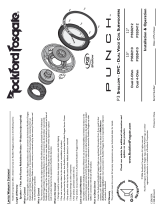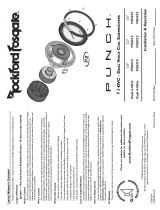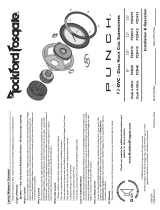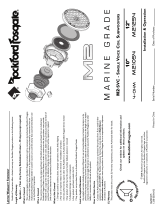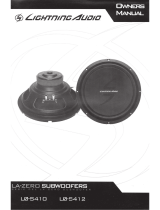
Printed in China
Installation & Operation
P3 S
HALLOW - DVC - DUAL VOICE
C
OIL S
UBWOOFERS
Serial Number: Date of Purchase:
Rockford Corporation offers a limited warranty on Rockford Fosgate products on the following terms:
Length of Warranty
Speakers – 1 Year. Any Factory Refurbished Product – 90 days (receipt required)
What is Covered
This warranty applies only to Rockford Fosgate products sold to consumers by Authorized Rockford Fosgate
Dealers in the United States of America or its possessions.Product purchased by consumers from an
Authorized Rockford Fosgate Dealer in another country are covered only by that country’s Distributor and
not by Rockford Corporation.
Who is Covered
This warranty covers only the original purchaser of Rockford product purchased from an Authorized
Rockford Fosgate Dealer in the United States. In order to receive service, the purchaser must provide
Rockford with a copy of the receipt stating the customer name,dealer name,product purchased and date of
purchase. Products found to be defective during the warranty period will be repaired or replaced
(with a product deemed to be equivalent) at Rockford's discretion.
What is Not Covered
1.Damage caused by accident, abuse, improper operations,water, theft, shipping
2.Any cost or expense related to the removal or reinstallation of product
3.Service performed by anyone other than Rockford or an Authorized Rockford Fosgate Service Center
4.Any product which has had the serial number defaced, altered, or removed
5.Subsequent damage to other components
6.Any product purchased outside
the U.S.
7.Any product not purchased from an Authorized Rockford Fosgate Dealer
Limit on Implied Warranties
Any implied warranties including warranties of fitness for use and merchantability are limited in duration to the
period of the express warranty set forth above.Some states do not allow limitations on the length of an implied
warranty, so this limitation may not apply. No person is authorized to assume for Rockford Fosgate any other
liability in connection with the sale of the product.
How to Obtain Service
Contact the Authorized Rockford Fosgate Dealer you purchased this product from. If you need further
assistance,call 1-800-669-9899 for Rockford Customer Service.You must obtain an RA# (Return
Authorization number) to return any product to Rockford Fosgate.You are responsible for shipment
of product to Rockford.
EU Warranty
This product meets the current EU warranty requirements, see your Authorized dealer for details.
2011 Rockford Corporation.All rights reserved.
Rockford Fosgate, the Rockford Fosgate logo, and the PUNCH logo are either
registered trademarks or trademarks of Rockford Corporation.
LIMITED WARRANTY STATEMENT
Check our website for additional information and
updates on these products.
www.RockfordFosgate.com
8" 10" 12"
Dual 2-Ohm P3SD2-8 P3SD2-10 P3SD2-12
Dual 4-Ohm P3SD4-8 P3SD4-10 P3SD4-12
1230-57070-01

2
This manual outlines two specific types of enclosures that provide
distinctly different performance.This section is to help you decide
which type is best for your application.
SEALED ENCLOSURES
Sealed enclosures are the simplest to build.The most important part of
building a sealed enclosure is to make sure that the enclosure is airtight.
Using glue and some type of sealant on all seams will ensure solid
construction and prevent air leaks.The box volume will directly impact
the performance of the speaker. Larger enclosures will provide flatter
response and deeper bass where smaller boxes will provide a bump in
the response curve and generally higher output for greater SPL.
Advantages of sealed enclosures:
• Small enclosures
• Linear (Flat) response
• No port noise
• High power handling at all frequencies
• Excellent for sound quality
• Extended low frequency output when compared to vented enclosures
VENTED ENCLOSURES
Vented enclosures vary only from the sealed enclosure in that a vent or
port is added to “tune” the enclosure.The enclosures recommended are
designed for great overall performance. Larger boxes tend to be easy to
tune to lower frequencies while medium and small boxes are easier
to tune to higher frequencies.The vented design is less linear in
response than the sealed box but with noticeably more output at
the tuning frequency.
Advantages of vented enclosures:
• Higher average output than sealed
• Tuning frequency can be easily adjusted by changing port length
• Deep bass response with lower power requirements
• Great for high output with limited power
The graph shown here is a sample of how the F3 drop-off
point differs between sealed and vented enclosures.
BUILDING AN ENCLOSURE
To work properly, the walls of the enclosure must be rigid and not flex
when subjected to the high pressures generated by the speaker's
operation. For optim
um performance, we recommend using 3/4" MDF
(Medium Density Fiberboard) and internal bracing.The enclosure should
be glued together and secured with nails or screws.
CALCULATING VOLUME
Calculating volume is merely a matter of measuring the dimensions in
inches and using the formula: H x W x D divided by 1728 (cubic feet).
See block below.
If two facing sides are of uneven length, add them together and divide by
two to take the average. Using this number will give you the volume
without the necessity of calculating the box in sections and adding the
sections together.The thickness of the baffle material reduces the internal
volume so this must be subtracted from the outside dimensions to
determine the internal volume.The speaker itself also reduces the
internal volume.The amount of air displaced by each model is listed on
the specification sheet and should also be subtracted from the gross
volume calculation.
SAFETY
CARTON CONTENTS
CAUTION: Before installation, disconnect the battery
negative (-) terminal to prevent damage
to the unit, fire and/or possible injury.
PRACTICE SAFE SOUND™
Continuous exposure to sound pressure levels over 100dB may
cause permanent hearing loss. High powered auto sound systems
may produce sound pressure levels well over 130dB. Use common
sense and practice safe sound.
• (1) Punch P3 Shallow Series Subwoofer
• (1) Painted aluminum decorative trim ring
• (8) Socket head wood screws
• (1) Socket head driver bit
RECOMMENDED ENCLOSURES
VENTED VS SEALED
60.0
70.0
80.0
90.0
100.0
110.0
120.0
130.0
10.0 20.0 40.0 60.0 80.0 100.0 200.0 1000.0
Frequency, Hz
Sealed Box Vented Box
Box Volume Height
"
x Width
"
x Depth
"
Divided by (cubic feet) 1728

3
NOTE: Vb is the gross volume, which is the TOTAL internal volume, before any speaker and/or port displacement.
All external dimensions were based on the use of 3/4" (1.90cm) materials.
NOTE: When using enclosures other than recommended, call Technical Support for correct application.
NOTE: Vb is the gross volume, which is the TOTAL internal volume, before any speaker and/or port displacement.
All external dimensions were based on the use of 3/4" (1.90cm) materials.
NOTE: When using enclosures other than recommended, call Technical Support for correct application.
SEALED ENCLOSURES
VENTED ENCLOSURES
Specifications subject to change without notice
Sealed Enclosure Recommendation
Recommended Sealed Enclosure Volume Range
SEALED ENCLOSURES
V
b
- Internal Area cu. ft.
)retiL(
F
3
- -3dB Point (Hz)
Qtc- Enclosure Damping
H - Height-inch
)mc(
W - Width-inch
)mc(
D - Depth-inch
10"
P3SD2-10 / P3SD4-10
0.50
(14.16)
46.9
0.90
13.5
(34.29)
20.0
(50.80)
5.50
(13.97)
8"
P3SD2-8 / P3SD4-8
0.25
(7.10)
49.3
1.29
10
(25.4)
16.5
(41.91)
5.0
(12.70)
12"
P3SD2-12 / P3SD4-12
1.00
(28.32)
40.0
1.01
16.0
(40.64)
20.0
(50.80)
8.0
(20.32)
SEALED ENCLOSURES
10"
P3SD2-10 / P3SD4-10
0.40 to 1.00
(11.33 to 28.32)
8"
P3SD2-8 / P3SD4-8
0.20 to 0.70
(5.66 to 19.82)
12"
P3SD2-12 / P3SD4-12
0.60 to 1.20
(16.99 to 33.98)
)mc(
V
b
- Volume Range cu. ft.
(Liter)
Specifications subject to change without notice
Number of ports noted in ( )
Vented (Ported) Enclosure Sizes
V
b
- Internal Area cu. ft.
(Liter)
F
b
- Tuning Frequency (Hz)
F
3
- -3dB Point (Hz)
H - Height-inch
(cm)
(cm)
(cm)
(cm)
W - Width-inch
D - Depth-inch
P - Port Diameter and
Length-inch
NOTE: The port shown can be placed on any face of the enclosure as long as the port ends are not obstructed.
NOTE: When using vented enclosures, for maximum reliability and power handling ensure that a subsonic or "infrasonic" filter is used so that
only usable low frequency signal is sent to the subwoofer.
VENTED ENCLOSURES
10"
P3SD2-10 / P3SD4-10
1.00
(28.32)
47.5
36.0
15.5
(39.37)
24.0
(60.96)
7.0
(17.78)
(1) 4 x 12
(1) (10.16 x 30.48)
(1) 3 x 9
(1) (7.62 x 22.86)
(1) 4 x 12
(1) (10.16 x 30.48)
8"
P3SD2-8 / P3SD4-8
0.75
(21.24)
47.5
37.0
14.0
(35.56)
24.0
(60.96)
6.0
(15.24)
12"
P3SD2-12 / P3SD4-12
1.25
(35.40)
42.5
34.0
16.0
(40.64)
24.0
(60.96)
8.0
(20.32)
W
H
D
P
W
H
D

4
Specifications subject to change without notice
CVD-wollahS 3P HCNUP
A hcni-retemaiD gniR mirT-
)mc(
B hcni-thgieH gniR mirT-
)mc(
C hcni-retemaiD gnitnuoM-
)mc(
D hcni-htpeD gnitnuoM-
)mc(
E hcni-retemaiD llarevO-
)mc(
F hcni-retemaiD eloH wercS-
)mc(
G .tf.uc - tnemecalpsiD rekaepS-
8"
P3SD2-8 / P3SD4-8
8.95
22.75
0.90
(2.26)
7.13
(18.10)
2.66
(6.75)
8.72
(22.15)
8.03
(20.4)
0.04
(1.13)
10"
P3SD2-10 / P3SD4-10
11.25
(28.60)
0.93
(2.36)
9.06
(23.00)
3.50
(8.90)
11.02
(28.00)
10.16
(25.8)
0.074
(2.10)
12"
P3SD2-12 / P3SD4-12
13.3
(33.80)
0.95
(2.40)
11.22
(28.50)
3.65
(9.25)
13.07
(33.20)
12.28
(31.2)
0.086
(2.45))retiL(
PHYSICAL DIMENSIONS
B
D
C
A
F
E
G

5
Specifications subject to change without notice
CVD-wollahS 3P HCNUP
)smho( ecnadepmI lanimoN
)zH( esnopseR ycneuqerF
hcni - retemaiD lioC ecioV
)mc(
.tf.uc - tnemecalpsiD
)retiL(
)zH( ecnanoseR riA eerF - sF
stQ
.tf.uc - saV
)retiL(
hcni - xamX
)mc(
)m1/w1 @ Bd( LPS
)SMR( sttaW-gnildnaH rewoP
)kaeP(
10"
P3SD2-10 / P3SD4-10
2 x 2 / 2 x 4
40-250
2.5 (4-Layer)
(6.35)
0.074
(2.10)
40
0.64 / 0.78
0.50
(14.3)
0.33
(0.84)
83
300
600
12"
P3SD2-12 / P3SD4-12
2 x 2 / 2 x 4
34-250
2.5 (4-Layer)
(6.35)
0.086
(2.45)
34
0.67 / 0.72
1.25
(35.3)
0.33
(0.84)
85
400
800
8"
P3SD2-8 / P3SD4-8
2 x 2 / 2 x 4
38-250
2.0 (2-Layer)
(5.16)
0.04
(1.13)
38
0.72 / 0.87
0.56
(15.8)
0.33
(0.84)
82
150
300
SPECIFICATIONS
WIRING CONFIGURATIONS
By varying the wiring configuration of your speakers you can create an
impedance load to match your system.Altering the wiring configurations
gives a range of options for impedance loads. Series, Parallel, or
Series-Parallel wiring configurations are different techniques for wiring
speakers that provide different loads. Series configuration is a string
method where speakers are wired end to end. Parallel configuration
uses two or more speakers wired across common terminals.
Series-Parallel configuration combines both techniques. Choose the
wiring diagram that corresponds to the number of woofers and the
impedance of your amplifier.
SUBWOOFER CROSSOVERS
There are two operational types of crossovers, passive and active.
Passive crossovers (coils or inductors) are placed on the speaker
leads between the amplifier and speaker.An active crossover is an
electronic filter that separates the audio signal fed to different
amplifiers. For optimum subwoofer performance, we recommend
using an active 80-100Hz low-pass crossover at 12dB/octave.
Page is loading ...
Page is loading ...
Page is loading ...
/
